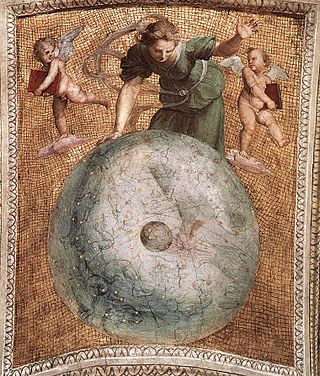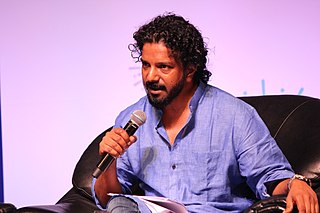Related Research Articles
Metaphysics is the branch of philosophy that studies the fundamental nature of reality. This includes studies of the first principles of: being or existence, identity, change, consciousness, space and time, necessity, actuality, and possibility. It can also include questions about the existence of God, as well as relationships between foundational philosophical ideas such as between mind and matter, cause and effect, substance and attribute, or potentiality and actuality.

Monism attributes oneness or singleness to a concept, such as to existence. Various kinds of monism can be distinguished:
Theology is the study of religious belief from a religious perspective. More narrowly it is the study of the nature of the divine. It is taught as an academic discipline, typically in universities and seminaries. It occupies itself with the unique content of analyzing the supernatural, but also deals with religious epistemology, asks and seeks to answer the question of revelation. Revelation pertains to the acceptance of God, gods, or deities, as not only transcendent or above the natural world, but also willing and able to interact with the natural world and to reveal themselves to humankind.
Christian philosophy includes all philosophy carried out by Christians, or in relation to the religion of Christianity. Christian philosophy emerged with the aim of reconciling science and faith, starting from natural rational explanations with the help of Christian revelation. Several thinkers such as Origen of Alexandria and Augustine believed that there was a harmonious relationship between science and faith, others such as Tertullian claimed that there was contradiction and others tried to differentiate them.
The perennial philosophy, also referred to as perennialism and perennial wisdom, is a perspective in philosophy and spirituality that views religious traditions as sharing a single, metaphysical truth or origin from which all esoteric and exoteric knowledge and doctrine has grown.

The term Metaphysical poets was coined by the critic Samuel Johnson to describe a loose group of 17th-century English poets whose work was characterised by the inventive use of conceits, and by a greater emphasis on the spoken rather than lyrical quality of their verse. These poets were not formally affiliated and few were highly regarded until 20th century attention established their importance.
Hindu philosophy or Vedic philosophy is the set of Indian philosophical systems that developed in tandem with the religion of Hinduism during the iron and classical ages of India. In Indian tradition, the word used for philosophy is Darshana, from the Sanskrit root drish.
The history of theology has manifestations in many different cultures and religious traditions.

Ramanuja, also known as Ramanujacharya, was an Indian Hindu philosopher, guru and a social reformer. He is noted to be one of the most important exponents of the Sri Vaishnavism tradition within Hinduism. His philosophical foundations for devotionalism were influential to the Bhakti movement.
Julius Lipner, who is of Indo-Czech origin, was Professor of Hinduism and the Comparative Study of Religion at the University of Cambridge.
Western literature, also known as European literature, is the literature written in the context of Western culture in the languages of Europe, and is shaped by the periods in which they were conceived, with each period containing prominent western authors, poets, and pieces of literature.

The unmoved mover or prime mover is a concept advanced by Aristotle as a primary cause or "mover" of all the motion in the universe. As is implicit in the name, the unmoved mover moves other things, but is not itself moved by any prior action. In Book 12 of his Metaphysics, Aristotle describes the unmoved mover as being perfectly beautiful, indivisible, and contemplating only the perfect contemplation: self-contemplation. He equates this concept also with the active intellect. This Aristotelian concept had its roots in cosmological speculations of the earliest Greek pre-Socratic philosophers and became highly influential and widely drawn upon in medieval philosophy and theology. St. Thomas Aquinas, for example, elaborated on the unmoved mover in the Quinque viae.
The transcendentals are "properties of being", nowadays commonly considered to be truth, unity (oneness), beauty, and goodness. The conceptual idea arose from medieval scholasticism, namely Aquinas but originated with Plato, Augustine, and Aristotle in the West. It is believed to be prefigured in the Bhagavadgita, an ancient Hindu classic, which illuminates the doctrines of Yoga. Viewed ontologically, the transcendentals are understood to be what is common to all beings/things/identities, and all things that exist can be judged, or appraised, or may be said to be or possess the innate qualities and characteristics which we consider or deem True, Beautiful and Good. From a cognitive and "first principles" horizon, going all the way back to Aristotle, they are the "first" concepts, since they cannot be logically or deductively traced back to "a prior metaphysics" preceding their Rational unfoldment and display.

In Hinduism, the concept of God varies in its diverse religio-philosophical traditions. Hinduism comprises a wide range of beliefs about God and Divinity, such as henotheism, monotheism, polytheism, panentheism, pantheism, pandeism, monism, agnosticism, atheism, and nontheism.
Metaphysics is the branch of philosophy that investigates principles of reality transcending those of any particular science. Cosmology and ontology are traditional branches of metaphysics. It is concerned with explaining the fundamental nature of being and the world. Someone who studies metaphysics can be called either a "metaphysician" or a "metaphysicist".
The following outline is provided as an overview of and topical guide to metaphysics:

In Hinduism, Brahman connotes the highest universal principle, the Ultimate Reality of the universe. In major schools of Hindu philosophy, it is the immaterial, efficient, formal and final cause of all that exists. It is the pervasive, infinite, eternal truth, consciousness and bliss which does not change, yet is the cause of all changes. Brahman as a metaphysical concept refers to the single binding unity behind diversity in all that exists.
Shakta Upanishads are a group of minor Upanishads of Hinduism related to the Shaktism theology of a Goddess (Devi) as the Supreme Being. There are 8 Shakta Upanishads in the Muktika anthology of 108 Upanishads. They, along with other minor Upanishads, are generally classified separate from the thirteen major Principal Upanishads considered to be from the ancient Vedic tradition.

Shaj Mohan is an Indian philosopher. His philosophical works are in the areas of metaphysics, reason, philosophy of technology, philosophy of politics, and secrecy. Mohan's works are based on the principle of anastasis according to which philosophy is an ever-present possibility on the basis of a reinterpretation of reason.
References
- Chitty, Simon Casie (1859). The Tamil Plutarch, containing a summary account of the lives of poets and poetesses of Southern India and Ceylon. Jaffna: Ripley & Strong. p. 56.